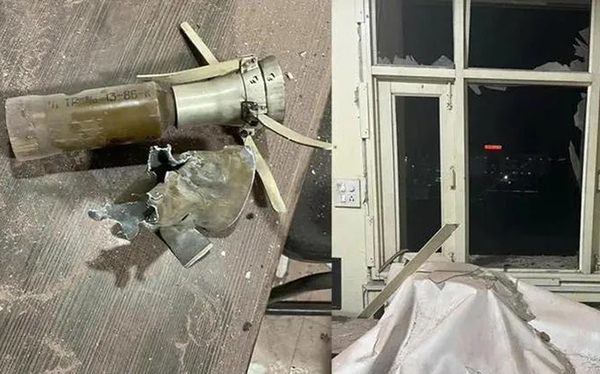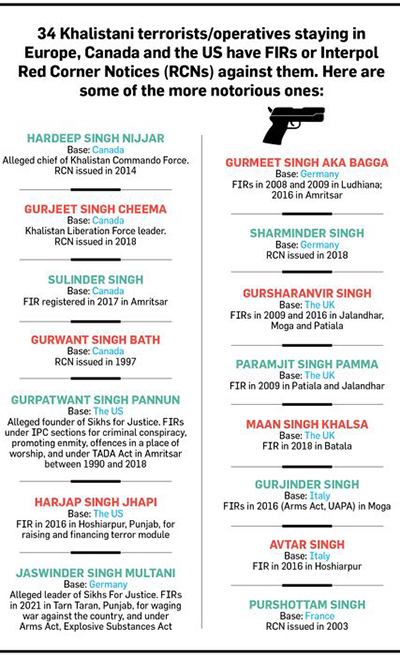Canada based gangs fomenting trouble
The use of Rocket Propelled Grenade Launchers (RPG) in the Mohali terror attack, on 9 May, and the smuggling in of US military hardware abandoned in Afghanistan into Kashmir expands the horizon of Pakistan’s proxy war against India.
The arrest of gangster Lawrence Bishnoi, the masterminded behind the May 29 murder of Punjabi rapper Sidhu Moosewala and his gang members unravelled many conspiracies Bishnoi is partly responsible for a flurry of activity that has begun on the diplomatic and security front.
The unassuming Bishnoi heads a transnational network of criminals that spreads from Moga in Punjab to safe-houses in Pakistan, all the way up to Canada. According to the Punjab Police, he runs an international extortion racket, headed by Satinderjit Singh alias Goldy Brar in Canada and Harjot Singh Gill in the US.
The Bishnoi gang, though, is just one piece of the foreign-based gangster puzzle. A common link between the gangsters in India and those in Canada and the west is Harwinder Singh Sandhu, aka Rinda—a Pakistan-based gangster-turned-terrorist who allegedly masterminded the RPG attack on the Punjab Police’s intelligence headquarters in Mohali.
Rinda is wanted by the Punjab Police in 22 cases and by the Maharashtra Police in two. He is said to be in Pakistan now, under a fake identity with an Indian passport, reportedly sheltered by Pakistan-based terrorist groups and the Inter-Services Intelligence.
With all this coming to light, security officials say that the old Khalistan-ISI nexus is far from dead; only the original leadership, nurtured by the ISI, has grown old, and a new team had to be created. This new group consists of at least 34 new faces—including Bishnoi and Brar—who are based in the US, the UK, Canada, Germany and some other European countries. The new set has stylish branding and westernised names like Brothers Keepers, Hell’s Angels and Red Scorpions.
According to investigators, the Bishnoi gang, Rinda and the Canadian gangsters have several meeting points.
Hardeep Singh Nijjar of the Khalistan Tiger Force—against whom there are at least 10 FIRs in Punjab and Haryana, and who is on the National Investigation Agency’s wanted list—is learnt to be living in Surrey, British Columbia, on a Canadian passport.
The Indian government has reportedly sent dossiers to different countries with proof against these men, but they are yet to consider extradition.
Veteran Canadian Broadcasting Corporation journalist Terry Milewski said his country does not see the Khalistani-terrorist nexus as a serious problem. The gangster activities are dealt with as “routine police problems”.
In Canada, certain politicians are against defining the [Khalistan] problem as a national security threat. That does not match Delhi’s expectations. But the fact remains that Canada safeguards freedom of speech and, legally, the country is correct to say that merely advocating a separate Sikh state and shouting ‘Khalistan Zindabad’ is not a crime.”
Most gangsters on India’s wanted list are Canadian citizens and, unless they commit a crime on Indian soil, Indian authorities cannot ask for their deportation or extradition. Western countries have also quoted their privacy laws for not sharing any information about citizens in their countries, even if they have links in Punjab. The other problem is the vast legal paperwork that comes into play, in each case, to prove the identity of the accused. Many have taken political asylum with new identities
But when some stray bullets hit people of the host country, a crackdown becomes inevitable. The July killing of Ripudaman Malik—who was acquitted in the 1985 Air India terror bombing case—has caught the attention of the Canadian police. Malik, a Canadian citizen, was keen on exposing the nexus between the ISI and Khalistani groups. He was unguarded as he enjoyed the freedom Canada was offering him. Days later, on July 24, Brothers Keepers member Meninder Dhaliwal and his friend Sat Gill were shot dead in a police encounter.
Though pro-Khalistani elements account for only a fraction of the Indian community in Canada, they have an outsized influence in community affairs. They gain legitimacy by acting as vote banks in various foreign countries, and remain a potent force that is being tapped by anti-India elements.
There was just a minuscule lot that demands a separate Khalistan today. The Khalistan Referendum by Sikhs for Justice has been an utter failure in India and abroad. So, the issue has completely failed as a geopolitical matter.
The need is for strategic and diplomatic cooperation to weed out the criminal elements, funded by global terror groups, who are trying to disturb the social fabric of all countries involved.
Also, with Indian intelligence now claiming that the gangster-terror groups have co-opted the human trafficking and narcotics networks—thereby adding more money and muscle power—it is a wake-up call for all parties involved.



















